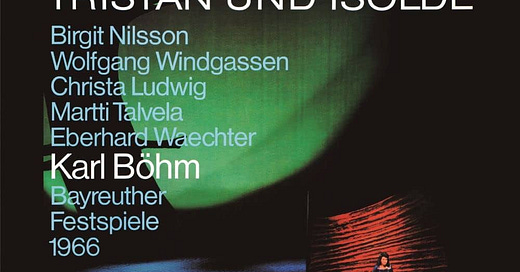The Top 75 Conductors Series
#11: Karl Böhm
________________
Welcome back to the Top 75 Conductors and thank you once again for being a subscriber!
At #11 in our alphabetical list of the 75 great conductors is the Austrian conductor Karl Böhm whose career spanned from the years of World War I until the advent of the digital recording medium. Böhm was a prolific recording artist, and left us a great number of recordings of varying composers, but he is most associated with Mozart, Wagner, and Strauss. While very much in the shadow of other conductors such as Herbert von Karajan, Böhm made his own quite significant impact on classical music in the twentieth century.
Karl Böhm (1894 - 1981)
Karl Böhm was born in Graz, Austria, the son of a lawyer. In fact, Karl himself studied law himself and even earned a doctorate in the subject prior to entering the conservatory in Graz. Later he would enroll in the conservatory in Vienna, studying under Eusebius Mandyczewski, a personal friend of Johannes Brahms.
Böhm’s first opportunity to conduct came in 1917 while he was serving as an assistant conductor in home town of Graz. By 1921, Böhm had been recommended to conduct the Bavarian State Opera, making his mark there with Mozart especially. One of his first engagements was to conduct Mozart’s singspiel opera Die Entführung aus dem Serail. The next decade saw Böhm appointed to music director posts in both Darmstadt and Hamburg.
In 1933, Böhm had his first opportunity to conduct in Vienna, leading a performance of Wagner’s Tristan und Isolde. In 1934, Böhm was appointed director of the Semper Opera in Dresden when the fervent anti-Nazi Adolf Busch was dismissed from the post and fled the country. More on that controversy later, but meanwhile Böhm remained in the position until 1942. He would conduct several world premieres, particularly of Richard Strauss’ music, and the two became friends. During this period, Böhm would also appear at the Salzburg Festival for the first time in 1938, conducting Mozart’s Don Giovanni, and was eventually invited to be a guest conductor. In 1943, he would secure a post with the Vienna State Opera, later becoming their director. This began a long relationship with the Vienna Philharmonic Orchestra as well, the resident orchestra for the Vienna State Opera.
After World War II, Böhm had to undergo a two-year denazification ban during which time he was investigated to be sure he didn’t hold any remnants of Nazism. In 1948, Böhm conducted Don Giovanni at La Scala in Milan, and then from 1950 to 1953 he led performances at the Teatro Colón in Buenos Aires, including works by Berg and von Einem. From 1954 through 1956, Böhm was the director of the Vienna State Opera and during that time he reconnected with the Dresden Staatskapelle orchestra. Thereafter, Böhm avoided any permanent appointments, being content to guest conduct.
Böhm made his debut at the Metropolitan Opera in New York in 1957, leading Mozart’s Don Giovanni. He would go on to conduct some 262 performances at the Met, leading the Met premieres of Berg’s Wozzeck, and Strauss’ Ariadne auf Naxos and Die Frau ohne Schatten, the latter being produced in the Met’s new home at Lincoln Center in 1966. Other major Met productions led by Böhm include Beethoven’s Fidelio, Wagner’s Tristan und Isolde, Lohengrin, Parsifal, Der fliegende Holländer, Die Walküre, and Die Meistersinger von Nürnberg, Mozart’s Le Nozze di Figaro, Verdi’s Otello, and Strauss’ Der Rosenkavalier, Salome and Elektra.



